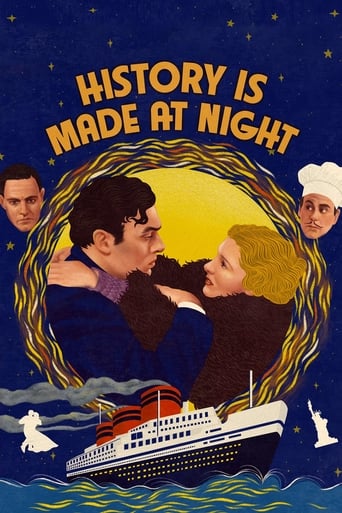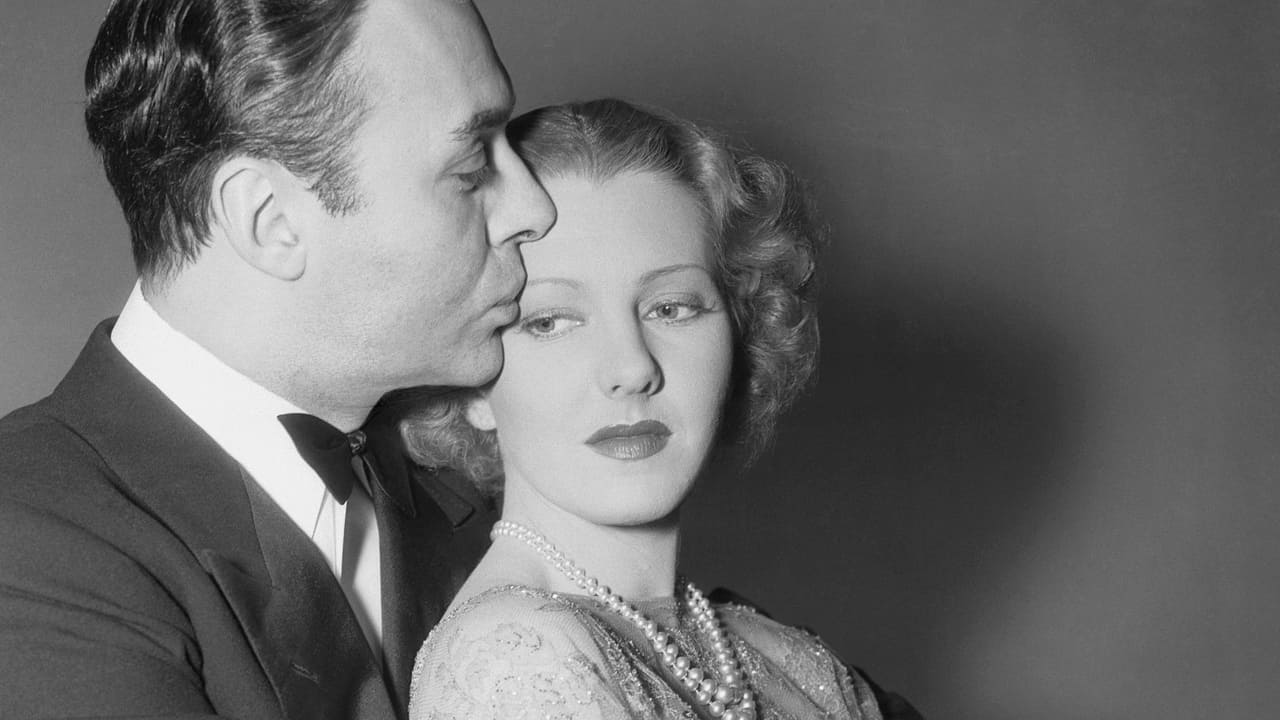showtrmp
Jean Arthur stars as a bored socialite married to insufferably possessive Colin Clive (didn't she notice he was a raving nut at some time during the courtship?) She sensibly divorces him, but he decides, with psychotic logic, to muck up the proceedings by arranging for his chauffeur to be found with Arthur in her Paris hotel room, thus forcing the divorce to be nullified (by French law). Charles Boyer is a Parisian headwaiter who overhears the scuffle between Arthur and the chauffeur from the next room; he climbs in through the balcony, overpowers both the chauffeur and Clive, and "kidnaps" Arthur, pretending to be a jewel thief. This being a movie, he spirits her at once to his restaurant, arriving just as it closes; he persuades his friend, the master chef, to keep it open for just the two of them. The scene which follows is the improbable, glamorous, heavenly highlight of the movie, with Arthur and Boyer falling in love over lobster and dancing a sweetly awkward tango during which Arthur tosses off her shoes (and, via movie symbolism, her previous unhappy life.) Unfortunately, Clive kills the unfortunate chauffeur to frame Boyer for the murder, and the contrivances that follow are too much to swallow even for the romantic melodrama intended here. Boyer and Arthur are an unimaginably charming pair, but they are asked to behave in a sickeningly noble fashion which doesn't suit either of them (Ingrid Bergman or Bette Davis could have made much more out of this scenario). Clive is so mad (and isn't funny or perversely charming at it) that the notion of Arthur submitting to him in order to save Boyer is very hard on the stomach. Even the most gushy-hearted romantic may have a hard time submitting to this one.
d-letta
I can't understand why this film isn't more recognized as a superior example of romantic movie-making. The cast is perfect, the cinematography (with one small exception of back projection that was jarring) is excellent, and the direction superb. Throw in a wonderful evocation of Paris (as good as Midnight), a great score and an incredibly moving final ten minutes and you have perfection. Everything comes together in perfect balance, much like Casablanca, and sadly so few other romantic films. I once asked a new acquaintance what his favorite film (he was eighteen at the time). When he responded History is Made at Night, I threw my arms around him and told him he'd won a place in my heart. Three cheers for History is Made at Night, a film that deserves rediscovery.
theowinthrop
I saw this for the first time in 1986 when it was on television. It's romance, and the superb acting of Clive, Boyer, and Arthur (abetted by Carillo and Lebedev), and the speed of events in it captivated me. And then came that "Titanic" - style ending, when the ship is nearly sunk on an iceberg was wonderful. The film just swept me into it. I rarely have found an undiscovered film that did that to me.Colin Clive died prematurely of pneumonia in 1937, only a few months after this film was made. Remembered today for Victor Frankenstein in two films, he was more than simply the man who shouted "IT'S ALIVE!!". The two films that show his real acting ability that are still shown are his performances in this film and CHRISTOPHER STRONG (as the romantic lead opposite the young Kate Hepburn). JOURNEY'S END would be a welcome addition to this list, but I have never even seen it listed on cable (and I wonder if the film still exists). But his insanely jealous and vicious Bruce Vail must stand for all of his acting abilities until JOURNEY'S END reappears. Fortunately it is sufficient. Clive never is shown in a favorable manner in the movie. He is constantly watching Arthur's every move, and he constantly torments her. But this is how he treats everyone in his path. Ivan Lebedev was supposed to be a willing tool for a scheme to blackmail Arthur into returning to Clive. Lebedev is knocked out by Boyer, and looks dead when Boyer leaves with Arthur. Clive comes onto the scene, and sees that Lebedev is more valuable as a corpse than as a living servant - he kills him to have a weapon against Arthur and Boyer. Similarly, he is willing to sink his flagship on it's maiden voyage, killing hundreds of innocent people, to kill Arthur and Boyer. His suicide at the film's end really does not ameliorate his actions - in fact one wonders if he kills himself out of shame or because he believes his wife is dead (like a typical domestic violence wife killer). At the same time, had he not killed himself, Clive knew what he would have faced - he had screamed an order at the Captain of the ship by radio to continue sailing at top speed into the icepack, despite the Captain's misgivings. This was heard by his Board of Directors. As they sit glued to the radio, hearing the probable news of the ship's sinking, they keep glaring at Clive. Had the boat sunk, and he not committed suicide, they would have testified against him at his trial for mass murder.He would have been probably hanged.The name of his character is Bruce Vail, and one wonders why this shipping owner is named "Bruce". His ordering of his largest flagship, on it's maiden voyage, to sail at top speed into waters full of ice, may be based on another Bruce, who also died in 1937. That was J. Bruce Ismay (more properly "Joseph Bruce Ismay"), the former Chairman of the White Star Line, who was a survivor of the sinking, in 1912, of R.M.S. Titanic. Ismay ordered Captain Smith to sail the new ship at top speed to try to capture the Atlantic Blue Riband (a momentary victory had it been successful - the Titanic was not built for speed, like her Cunard rivals Lusitania and Mauritania). He may have kept some of the ice messages Smith was to get from the Captain (most Titanic experts don't believe this, but the public did). But worst of all, unlike Astor, Strauss, Guggenheim, Widener, Butt, Millett, Stead, and the other celebrities on the ship, Ismay entered a lifeboat, and tried to keep his obvious survival from becoming glaringly public. It did not work, and he was (despite generous attempts at whitewashing him by Lord Mersey) pilloried by the public as a coward. He was forced out of all his business directorships, and the chairmanship of the shipping line his father founded. And he lived in exile at an estate at Connemara in Ireland. It really did not help. Children would follow him even there yelling "Coward, coward!" He was destroyed by the disaster that destroyed his flagship.I believe that the shadow of Mr. Ismay is used to coat the character of Mr. Vail, possibly unfairly but probably based on the popular view of Ismay. Bruce Ismay died of diabetics in 1937. Unlike Bruce Vail he did not have to blow his brains out.
Kalaman
Frank Borzage's "History Is Made at Night" is one of the most spiritually romantic of all films and a model of how to portray a sublime, gorgeous romance on screen. Jean Arthur and Charles Boyer have never been more sublime and magical; they give some of their most luminous and warmest performances. In many ways, this is Borzage's testament: full of warmth, humanity, and tenderness.


 AD
AD


